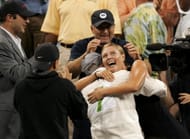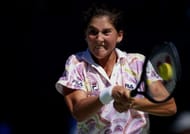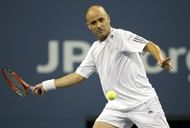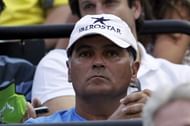Damir Dokic, Marinko Lucic, Peter Graf and Stefano Capriati. Just a few of tennis’s infamous ‘bad dads’, fathers who have been in the news for all the wrong reasons, that is once their oppressed children found the courage to finally come out and speak the truth. Players over the years have recounted horror stories growing up and even while on tour, which has made tennis and bad fathers go together like chips and sauce. Or like Damir Dokic said himself, ambassador threats and hand grenades.
However, like in any sphere of life, where there is bad, there is good. There have been a number of players, some of them champions, who have owed everything they’ve achieved in the sport to their fathers. Today being Father’s Day, we take a look at some of tennis’ most famous dads:
1.) Richard Williams:
When the two girls you coached end up winning 23 Grand Slam titles between them(and counting), you know you’ve done something right. 70 year-old Richard Williams, father of Venus and Serena Williams, is easily one of the most famous tennis fathers in history. Said to be inspired by watching 1978 French Open champion Virginia Ruzici, Williams decided that tennis was the ticket to fame, money and a world outside their undesirable Compton neighbourhood. Williams began taking both Serena and Venus to public tennis courts and started coaching them himself from 1995 onwards.
Success was almost immediate as the two sisters made a huge impact on the tennis world, carrying on the torch from their illustrious countrywomen before them as Serena was the first to win a Slam at the 1999 US Open. Venus followed it up with a win at Wimbledon in 2000 and since then, the two have racked up 21 more Grand Slam titles between them, and in the process completely breaking down barriers and completely changing the face of women’s tennis.
Again, someone who needs no introduction. Born in distant, war-torn Soviet Union, Yuri Sharapova and his wife Elena moved the family to the coastal town of Sochi when their daughter Maria was two years old. When in Sochi, Yuri befriended Aleksandr Kafelnikov(father of future Grand Slam champion Yevgeny) who gave Maria her first racquet at the age of 4. A chance meeting with Martina Navratilova at her tennis academy two years later resulted in the legend suggesting Sharapova to move to the Nick Bolletieri Academy in Florida to receive better training.
Yuri Sharapova, limited severely by finance as well as the language barrier(neither he nor Maria could speak English) packed his bags and moved halfway across the world to Florida in order to help his daughter achieve her dreams. Arriving in Florida with savings of $700 and without his wife, who got a visa only two years later, Yuri took up menial jobs such as dishwashing in order to fund his daughter’s training. Maria finally caught the eye of IMG, who agreed to sponsor her in 1995, and the rest as they say, is history.
Sharapova has won all four Grand Slam titles since her triumph as a bubbly 17 year-old at Wimbledon in 2004. Known to be one of the most mentally tough players on tour, she definitely owes a lot of that to her tough upbringing, brought about by the sacrifices that both she and her father had to go through in order for her to reach her present position. Yuri Sharapova is truly one of tennis’s good guys, and his daughter Maria has not let him down, repaying every bit of faith he had in her.
3.) Karoly Seles:
Another feel-good story that makes this list is the one of Karoly Seles and his daughter Monica. Seles was a professional cartoonist in Yugoslavia and made good use of that, drawing cartoons on tennis balls in order to stir the 5 year-old Monica’s interest in the game. Described by Monica as the architect and coach of her game, Karoly developed in Monica that unique double-handed backhand which was to prove so deadly in the years to come. Karoly was adored by Monica both as a father and a coach , and in 1986, moved the family to the United States and to the Nick Bolletieri Academy.
Seles soared through the ranks and won her first French Open title in 1990, the youngest ever winner at the age of 16. Seven more Grand Slam titles followed in just three years as Monica Seles started to seriously threaten Steffi Graf and her building legacy. This intense competition was sadly too much to take for one of Graf’s fans, Gunter Parche. Parche, who was clearly mentally unstable, invaded the court during a tournament in Hamburg in 1993 and stabbed Seles between her shoulder blades, forever changing her career and life. While Seles ultimately did return to tour and did win another Grand Slam, the stabbing along with the death of her beloved father in 1996 meant that she would never be the same player again.
4. ) Mike Agassi
This entry may come as a surprise to many, especially those who have read Andre Agassi’s autobiography ‘Open’. In the book, Agassi writes in great detail about how his father pushed him during his early years, so much so that Agassi began to hate the game. However, once it is looked at from a different perspective now that Andre’s career is over, we realise the true value of his father’s commitment to the cause.
Mike Agassi, like many on this list , was also an immigrant, with his family hailing from Iran. While he could not make it as a tennis pro himself, it was a dream for him to see at least one of his children make it where he could not. As Andre’s siblings fell by the wayside one by one, it was up to him to live out his father’s dream as he was made to train relentlessly, his potential slowly being harnessed by his observant father.
Agassi finally did make it to the pro tour and ended as one of the game’s greats, winning 8 Grand Slam titles along the way. While he still bears some resentment towards his father, it is obvious that he holds him in high regard, and admits that deep down, he thanks his father for what he did for him.
5.) Toni Nadal (uncle):
While Toni Nadal is not Rafael Nadal’s biological father, he could well lay claim to that title. ‘Uncle Toni’, as he is popularly known, has coached his nephew Rafael since the age of 4. When Nadal had to make the decision to choose between tennis and football at the age of 12, it was Uncle Toni who advised him that he would achieve greater success in tennis, and from then on, has always been by his nephew’s side, taking on the many roles of his coach, mentor, support system, strategist and emotional anchor.
Toni instilled important qualities in Rafa from an early age, training him on both bad and good courts, with both good and bad tennis balls, in order to teach him that winning and losing did not depend on anything other than his own attitude, perseverance and belief. These qualities have stuck with Rafa and even today, he comes across as an extremely down-to-earth and level-headed person.
Nadal is unquestionably one of the game’s greats. He has won 12 Grand Slam titles, become the youngest man in history to win all 4 Grand Slams and has an Olympic gold to boot. Time and again, Nadal goes back to his first and only coach, Toni Nadal, when asked who his inspiration in life is, and rightly so. Toni Nadal has been there for Rafa for more than twenty years now and fully deserves every accolade he gets.
What is the foot injury that has troubled Rafael Nadal over the years? Check here



